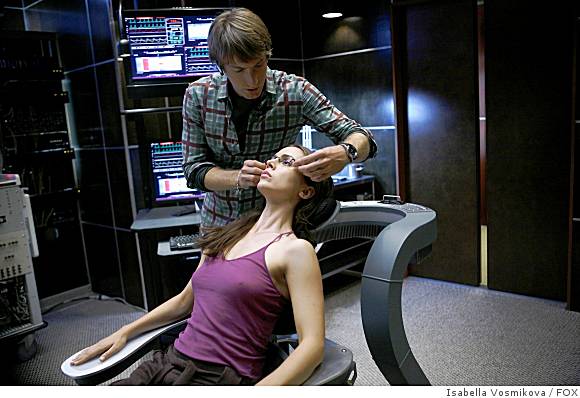http://youtu.be/yDcEKo4V7fA
LOS ANGELES, 2009 — A computer is hardware that runs software. You can boot your PC with Windows or Mac or Linux or something else. For 2 TV seasons Joss Whedon, Eliza Dushku & Co. explored the idea that the human body might be bootable with “different operating systems.”
Technically I think this scenario is unlikely (hahaha, because Vaneeesa really knows about this stuff! 😛 But that’s irrelevant in a way, because it’s the conceptual or metaphorical power of this idea that so compellingly resonates with what it means to be a human being, with the nature of reality, with what it means to be alive.
Mutant Enemy produced 27 episodes of Dollhouse, so it should be good for 3 blog posts:
• Forgotten Dreams
• Neurolinguistic Hacking
• Welcome to the Real World
Neal Stephenson’s cyberpunk novel Snow Crash serves at the foundational legend for the virtual world Second Life, and it could equally serve as the foundational legend for Dollhouse. With Second Life, Stephenson’s “Metaverse” is for many Second Life itself, and the much coveted Black Sun club sitting on the prime meridian of the Metaverse like some enormous LEA land grant. While Stephenson’s characters Hiro, YT, and even Uncle Enzo, can arguably claim to have saved human culture as we know it, it is Juanita, and her discovery of the ancient art of neurolinguistic programming, who ultimately saves humanity from its impending zombie future or Babel Infocalypse.
What is “Snow Crash?” It’s a drug. It’s a virus. It’s analog. It’s digital. Snow Crash is unique in that it has both chemical and digital forms. It can chemically enter your bloodstream, or it can enter your mindfile through your retina. In either form, L. Bob Rife’s Snow Crash finds its Dollhouse equivalent in Topher Brink’s “chair.” Snow Crash and The Chair both “wipe” the mind like formatting a hard drive, leaving a tabula rasa zombie waiting patiently on the shelf until it’s loaded with, well, whatever you want to call it, Code or Programming or Memories or Emotions or Drives or Needs or Persona. (Yes, it’s true, Joss Whedon just made a 27-hour Bergman film!)
But more on Neurolinguistic Hacking tomorrow… let’s think about Forgotten Dreams today…
FORGOTTEN DREAMS
In Dollhouse, “Actives” are imprinted with a persona, have some set of experiences, and in the end are “wiped” thus forgetting that this mortal shell ever had the experiences. What does it mean to have an experience and then not remember it? If a tree falls in the woods… but by the time you get there it’s standing again… did it make a sound? Did it ever fall at all?
In fact a critique of the show was that since Eliza Dushku’s character Echo took on a different, unremembered persona each week, it was difficult to make a connection or become involved with her or ultimately the show. Indeed Echo’s nemesis in the Dollhouse, Mr. Dominic, comes pretty close to making “dumb blonde” jokes about her. In “real” life we have always craved “sexy packages,” sometimes over “substance.” Presumably the Rock Star does not marry the Supermodel for her grasp of post-structuralist theory.
In Mr Dominic’s critique of Echo and some viewers’ critique of Dollhouse we are recapitulating our culturally schizophrenic practice of hating “The Pretty One” for not being “The Smart One” who we would have, in fact, ignored in favor of admiring “The Pretty One” who we could later hate for not being “The Smart One.”
In her book For The Time Being, Annie Dillard contemplates the Terra Cotta Warriors of Shaanxi Provence. She imagines what a gift it was to living soldiers to have over 8,000 terra cotta soldiers buried instead of them, thus extending each life for some number of decades. Yet in the fullness of time, however long each soldier may have lived beyond the Emperor’s death, can the difference really matter now, 22 centuries later? Each and every soldier who wasn’t buried alive then, has nonetheless, by 2012, been dead for over 2,000 years. Obviously a few decades more or less mattered a lot to those human beings in their own time in the 3rd century BCE, but does it make any difference at all here in the 21st century when, either way, they have been dead for so many generations on top of generations?
What is “heaven” anyway?
Is it an inconceivably vast collection of hard drives that gives continuity and therefore meaning to experiences and therefore to lives?
Can a thing that ends… have meaning?
Like a night blooming cactus whose flower begins to open at dusk, is enormous and radiant as it faces the glowing full moon, and then is dead with the coming of dawn’s light, perhaps the brevity of the Dolls individual persona cause us to imagine a sad, shallow, brittleness to their experiences. We might live for 100 years! Still, in that 101st year, you are as gone as a wiped Doll. Sure you may have touched someone, changed something, left a legacy during your time, but so might a Doll.
And what of dreams? We dream in extraordinary, remarkable, surrealist technicolor every night, yet only the barest few of us keep dream journals. For everyone else, that 1/3 of your life given over to dream reality is “wiped” with every dawn. If we don’t make those dreams part of our continuity of self, then they never happened, right? They have no meaning?
So each of us is a “Doll” for a full 1/3 of our existence?
In Blade Runner Leon says
Wake up! Time to die!
Our lives almost always seem too short. Indeed by the time we come to some rich understanding of ourselves and our world, by the time we “wake up,” it is already time to die. When Jim Morrison sang Break on through to the other side, did he mean to wake up? To die?
Every time Echo wakes up in the chair, every time we wake up in our beds, some life has died and been lost to the silent rhythms of the universe.
If “fiction” contains more human truth than “non-fiction,” if it more deeply reveals our wild improbable dreams and out deepest secret fears, then can you think of a character who clung, and scraped, and clawed to live on more desperately, like a drowning rat trapped in a sinking ship clawing at an air hole, than Blade Runner’s Roy Baty? Yet in his final moment, Baty realizes that all the extraordinary experiences he has lived will be lost
Like tears, in rain
When Echo wakes up, she asks, “Did I fall asleep?” and Brink replies, “For a little while.”
How long is “a little while”? Is Echo falling asleep a metaphor for us sitting zombie-like in a chair and watching Echo?
Is “a little while” the 42-50 minutes of a Dollhouse episode? The length of watching a film? Reading a book? One of Echo’s weekend “engagements?” The lifespan of a Terra Cotta Warrior? That hundred years you hope to live?
Is every time Echo wakes up a metaphor for the pathetic brevity of our own lives?




